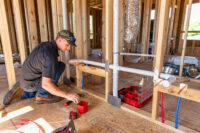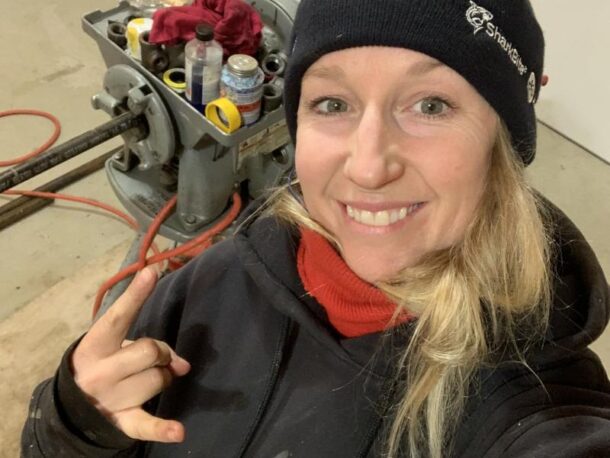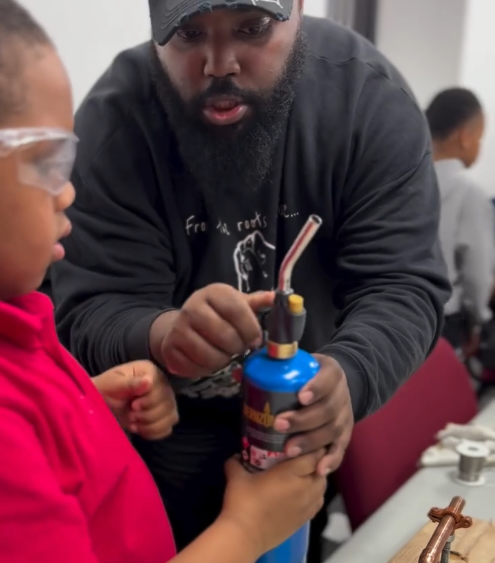Written by Chris Carrier, RWC Senior Marketing Director The shortage of plumbers our industry is dealing with has become so serious, it’s making headlines in the business world. An article in Bloomberg Businessweek’s March 2024 issue puts the problem in a national context: “America’s Plumber Deficit Isn’t Good for the Economy.” The article elaborates with a slew of Read more
Recruiting Talent

Written by Chris Carrier, RWC Senior Marketing Director
The shortage of plumbers our industry is dealing with has become so serious, it’s making headlines in the business world. An article in Bloomberg Businessweek’s March 2024 issue puts the problem in a national context: “America’s Plumber Deficit Isn’t Good for the Economy.” The article elaborates with a slew of stats that back up this subheading: “Young people are shunning an occupation that’s physically demanding and sometimes dirty, though well paid.
While the labor shortage isn’t new to those who have been in the industry long, it’s worth exploring the main cause of it and ways to get more people into the trade right now.

Understanding the plumbing recruitment crisis: The age factor
Age plays two roles in the plumber shortage. A large portion of the current plumbing workforce is nearing retirement age, and recruiting young people into plumbing is proving difficult. Although the recruitment pipeline is leaking at both ends, the jobs are there for the taking, with plenty of new opportunities opening. The latest data from the U.S. Bureau of Labor Statistics (BLS) projects there will be nearly 43,000 job openings for plumbers, pipefitters and steamfitters each year through 2032. These jobs mostly result from the need to replace workers who retire, change occupations or leave the workforce.
Knowing plumbing is one of the steadiest industries, how can plumbing business owners stay staffed with good plumbers? The truth is that it’s going to take some convincing.

Images courtesy of SharkBite Plumbing Solutions.
Repairing the leaky recruitment pipeline through education
If you run a plumbing company, the most concerning consequence of the labor shortage is the challenge of keeping enough good plumbers on your team. In the skilled trades, recruiting hinges on educating recruits. Raising awareness of opportunities is foundational. Many young Americans are simply unaware of the specialty options, job security and earning potential in plumbing. As an industry, we must invest more resources in promoting the plumbing profession. Just ask Mark Brown, a Philadelphia high school plumbing program instructor.
“There are so many people in our country who struggle with finding a suitable career path for them, and I believe it’s due to lack of exposure to career choices such as plumbing,” Brown said. After telling young people an opportunity exists, we need to convince them to explore it. To be persuasive, explain why plumbing is an excellent career option. Then dispel the myths and be open and truthful about the hard parts. Any recruiting efforts—whether joint or solo, online, printed or spoken—should start by selling the benefits, including:

Clint McCannon owns Cannon Plumbing in Braselton, Georgia.
Job security and stability
When you need a plumber, it’s rarely optional. Plumbing is an essential service with consistent demand, providing long-term job security and protection against economic downturns. For example, when the COVID pandemic put millions out of work, plumbers stayed on the job with a steady income.
“I was really nervous when COVID hit,” said Clint McCannon, owner of Cannon Plumbing in Braselton, Georgia. “I didn’t know what was going to happen. Our numbers were up over 35%, and it didn’t slow down. It sped up. Even when the economy is going down, if it’s something they can’t handle on their own, they’re going to call you.”
Given the plumber shortage, it’s highly unlikely that this career benefit will change anytime soon. Even as technological advances disrupt other trades, in plumbing, new technology tends to make the work easier rather than displacing the workers.
High earning potential
Plumbers enjoy competitive wages, and many have opportunities for overtime and bonuses. Their extent varies depending on the employer and specific job role. Even without pursuing overtime or bonuses, plumbers can enjoy a financially rewarding career free from the burden of student debt.
A high school diploma or equivalent is the standard education requirement for starting paid training or trade school. The BLS lists the 2023 median pay at $61,550 per year ($29.59 per hour), up from $60,090 in 2022 ($28.89 per hour), with plumbers at the high end of the spectrum earning a six-figure salary.
Geography greatly influences earnings, with average wages varying by state, based partly on the cost of living. According to Consumer Affairs, Illinois ranks highest with an annual average wage of $88,000, while Arkansas is at the bottom with plumbers earning $47,000 on average. Nationally, the top 10% of wage earners made more than $101,000 annually, and industry wages have been climbing steadily since at least 2012.
Paid training as an apprentice plumber
You don’t need any prior experience to start training to become a plumber, and once you apply for and secure an apprenticeship, it’s paid training on the job. Vocational-technical schools and unpaid pre-apprenticeships are the most common routes people take before getting on-the-job experience.
Choosing a paid plumbing apprenticeship over attending college with an unpaid internship can be a game-changer. With an apprenticeship, you’re earning money from day one while learning a valuable trade, rather than racking up student debt. You earn hands-on experience, real-world problem-solving skills and a direct path to a rewarding career in a high-demand field.
Apprenticeships also provide a structured learning environment where mentors are invested in your success, ensuring you gain both practical knowledge and industry credentials. For anyone looking to build a stable and prosperous future without the financial burden of college, a paid apprenticeship offers a practical and lucrative track.

Leslie McGlenen owns Pipe Wench Plumbing & Heating.
Career advancement opportunities
The plumbing profession also offers clear pathways for advancement, including opportunities to become a well-paid master plumber, start your own business or move into management roles. After finishing a plumbing apprenticeship, career advancement in the U.S. plumbing industry typically follows a structured path.
First, you become a journeyman plumber, gaining more responsibilities and independence. With experience and further certification, you can advance to a master plumber, which opens doors to higher-paying jobs and leadership roles. Any apprentice can become a master in this trade if they’re dedicated, and it pays to work your way up. An HR technology company called PayScale reports that in 2023, the median pay of a master plumber went up to $82,700—a jump of 21% from 2022.
Some plumbers eventually become contractors or specialize in areas like pipefitting, leading to even more career opportunities. Some of the most profitable plumbing businesses are owned or managed by plumbers who started as apprentices. Lesley McGlenen owns and operates Pipe Wench Plumbing & Heating in British Columbia, Canada.
“I got a lot of experience as a young apprentice,” she said. “Most of the time, I was the only apprentice at this company, so I got to work under three skilled journeymen who did different parts of the job. Depending on who I was working under, I learned different techniques.”
Successful franchise owners like Lesley can expand their businesses, creating a comfortable income and good jobs.

Kim Yeagley owns Gold Canyon Plumbing in Gold Canyon, Arizona.
Job satisfaction and community impact
Plumbers play a vital role in maintaining public health and safety. Being an essential part of your community’s workforce provides a sense of pride and fulfillment for those who appreciate making a tangible difference in people’s lives, homes and workplaces.
“When you leave, you’ve fixed their problem, you’ve made their day. That’s a good feeling inside,” said Kim Yeagley, owner of Gold Canyon Plumbing in Gold Canyon, Arizona. Despite the occasional dirty conditions, the satisfaction of solving problems and providing essential services to your community is genuinely rewarding. And like other skilled trades, plumbers take pride in their craftsmanship and enjoy building something from scratch. As a plumber, you can also choose to prioritize family and personal time.
“I don’t live to work. I work to live,” said Russel Sweeney, owner of Sweeney Remodeling and Plumbing in Jacksonville, Florida. “Through the years, I’ve learned that there is a necessity for work-life balance.”
Flushing fears and reconfiguring perceptions of plumbing
While there are many benefits in plumbing, there are still a lot of misconceptions and valid concerns that must be addressed in recruitment, including:
Physical demands
Don’t sugarcoat it. Plumbing is physically strenuous, often involving heavy lifting, strong tool work, awkward positions and repetitive movements. But desk jobs aren’t for everyone either. Plumbing can be a great career fit for people who love working with their hands. Former plumbing apprentice Anna Pearson said an office job just wouldn’t suit her.
“Forty hours out of my life every single week, being stuck in a cubicle, it’s just my actual nightmare,” she said.
Modern equipment helps with the physically challenging aspects. Advancements in technology and tools have made most tasks easier and more efficient than in decades past. For example, push fittings like SharkBite Max make it easy for new plumbers to start repairing and reconfiguring pipes with minimal instruction, performing smaller jobs in just minutes. They also help plumbers get in and out of tight or uncomfortable spaces more quickly so they can put minimal strain on their bodies.

Russel Sweeney owns Sweeney Remodeling and Plumbing in Jacksonville, Florida.
Safety and working conditions
The job sometimes involves working in dirty and confined environments, which can be unappealing or seen as hazardous. Fortunately, plumbers of all types get paid to earn comprehensive safety training through their certifications that prepare them to handle potentially dangerous job site situations safely. Plus, safe working conditions are required by law. The Occupational Safety and Health Administration (OSHA) enforces federally mandated safety standards that plumbing employers must comply with, which apply to both service and commercial plumbers. Employers provide all the necessary protective gear and equipment to ensure safety and comfort on tough jobs, including water-proof gloves, knee pads, safety glasses, hard hats and respirators.
Serious injuries are very rare for plumbers, pipefitters and steamfitters. Nonfatal injuries are also exceptionally rare for both residential plumbers and commercial plumbers who work on new builds, even though working in people’s homes is generally considered safer than plumbing on a construction site. In 2022, BLS data shows that out of 865 reported fall injuries, including slips and trips, only 27 involved plumbers (3%). The BLS lumped plumbers in with HVAC contractors. This group had no reported injuries that year from exposures to harmful substances or environments, and no injuries caused by contact with objects or equipment.
Social stigma and perception
The reality is that many college graduates have student debt and still earn less than the plumber they call to fix their toilet, but there’s a strong societal push toward college degrees in high school, leading many young people to overlook the trades as they’re considering a career path. In the absence of hard facts, students often view trades like plumbing as a less prestigious career compared to white-collar jobs.
However, plumbers earn competitive salaries with excellent job security because they’re essential to our homes, businesses and critical infrastructure. Remind recruits that this trade offers opportunities for entrepreneurship and a stable, upward career path, with the added satisfaction of helping people every day. Another perk is that you can live almost anywhere and still have excellent job prospects.
Job security concerns
Some mistakenly perceive plumbing as less stable compared to careers in rapidly growing tech and service sectors where layoffs are actually far more common. Layoffs are very rare in plumbing, even during recessions, and the labor shortage shows that’s unlikely to shift.
“It’s a very recession-proof job,” Sweeney said. Research firm IBISWorld reports that “constant demand keeps direct competition low.” Industry analysts expect a steady demand for plumbing services in new construction, and IBISWorld states that “refurbishment and maintenance of aging plumbing systems have remained steady streams of income for independent plumbers and companies alike. This will not change in the near future.”
If you encounter stability concerns as you do outreach, set the record straight and back it up with facts. The U.S. Department of Labor provides a helpful resource with its Occupational Outlook Handbook for Plumbers, Pipefitters and Steamfitters. This periodically updated handbook answers every question a plumbing recruit is likely to ask.
Training requirements
Extensive apprenticeships and on-the-job training can deter those looking to enter the workforce quickly. Plumbing apprenticeships can indeed last up to 5 years, but they allow you to earn a living while gaining hands-on experience in the field, providing valuable training without the high costs of a traditional degree.
Another option is vocational-technical programs that fast-track your plumbing career, offering practical skills, recognized certifications and employment immediately after graduating.

Mark Brown, a Philadelphia high school plumbing program instructor.
Take advantage of the facts
Whether it’s educational social media videos, partnering with trade schools or hosting open- house demonstrations in your community—whichever format, strategy or platform you choose for your recruiting efforts—take a fact-based approach. Reality is your ally in persuasion. With excellent job prospects and rising pay, it’s a great time to join the plumbing profession, and having the facts on your side can make recruiting a little easier. Take it from Pearson.
“I researched it for a few days, I saw nothing but good things,” the former plumbing apprentice said. “And so, I decided to go ahead and take the plunge.”
